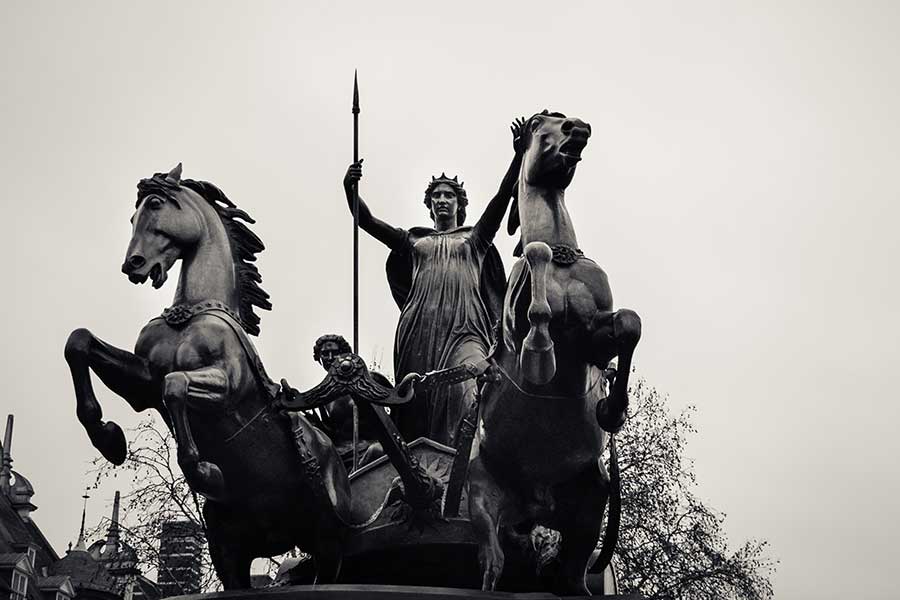THOUGHTS | DREAMS | ACTION

THOUGHTS | DREAMS | ACTION

The old gods and the new
“We won’t defeat these people by fighting their warriors. We beat them by fighting their gods. We need to kill their gods.”
So says David Morrisey in his role as Aulus Plautius, the Roman general charged, at least outwardly, with the subjugation of Rome’s latest source of plunder and taxes. But (spoiler alert: Skip to the next paragraph if you a) haven’t watched it and b) haven’t read any of the reviews yet): he’s not just a Roman general, he’s the embodiment of a demon from ancient times, before humanity walked the earth, or at least this bit of it; and as such he is at war with Veren, the chief druid, who is also ‘the Second Man’, made soon after the demon he is fighting.
So, amidst all the strangeness, the core of Britannia is the gods: who they are, who can talk to them and how they operate. Jez Butterworth (he of the stage play Jerusalem, amongst other plaudits), claims that this is his big interest, and he’s certainly opening doors to new ideas and new ways of thinking. If he can drop his obsession with demons, he might even open doors to the old gods.
The making of a god
Because they are there. Let’s look for a moment, at what makes a god. Let me lead you on a short journey. Let go of the present moment and imagine that, once upon a time, long ago and far away you are a fisher in a small village by a coast. You go out fishing daily with your friends and all is well. You don’t make a lot of money, but you don’t need to; this is not a world with mortgages, car rentals, and payments to Sky Atlantic. It’s a world where everyone knows everyone; everyone more or less gets along, and life is fine until natural disasters strike.
Which it does one day in a storm that destroys your boat. All your friends drown and you’re 99% of the way there, but then, clinging to a spar in the wild ocean, you experience a miracle: the giant purple octopus that lives beneath the sea comes to rescue you, lifting you in its many arms, and setting you on the beach where your friends can find you in the morning, still alive and raving about your experience.
When you recover, you are the new prophet of a new god. You tell everyone who will listen of your experience and, because you are newly alive, and have great faith, your boat garners good people who fish well and, by the standards of your time, you grow rich. You owe it all to The Giant Purple Octopus that lives beneath the Sea (TGPOtlbtS) and you make sure you offer it things it might like: an annual bounty of fish on the anniversary of your Miracle. They start off as a few little fish but in a decade or so, it’s a tonne at a time. Then you think maybe it wants actual people, so you start throwing in a few criminals: after all, they were going to be executed anyway, may as well do it right. Then you start throwing in un-believers, because all gods are jealous gods and they like nothing more than the blood of people who refuse to worship them. Besides, if you kill the unbelievers, it’s amazing how many more people start to believe, and then you can garner more power. Which his cool, because you’re not fishing so much now and you need someone to pay you to keep telling people how clever you are.
Then you die, but that’s OK, because there’s a priesthood now, and if they soon devolve into factions and start fighting over the magical number 8 and whether it arises from 3 + 5 or 6+ 2, or – a small number here, 4×2) or a few on the fringes with 7+1 and some serious heretics whom everyone burns who are going with 8+0… then the world can keep going, fighting about the god…
Which may sound familiar. It is meant to. But the point is, does The Giant Purple Octopus exist? So here’s another story – a true one – of Alexandra David-Néel, a late nineteenth century explorer who learned some of the more esoteric aspects of Buddhism and decided to make a tulpa – a spirit of a jolly monk. She focused her intent, meditated for days and the spirit-monk duly appeared. Only after a while, he stopped being jolly and became a thin, wiry not-so-jolly monk. Others of her group started to see him and he began to cause serious trouble. They had to find a Tibetan Lama of high enough degree to get rid of him.
The creation of a ‘tulpa’ is not unusual in Tibetan literature and lore: if you focus enough (if you know how to focus your intent, which takes considerable will and practice) then it’s relatively straightforward.
So here’s my theory: focused human intent is our greatest strength. It may be one of the very few things that genuinely sets us apart from other species. Most of us don’t bother to learn how to focus our intent: it takes many, many hours of meditation: ten thousand is just the start. But powerful emotions coupled with the sense of time having stopped are two of the key features of focuses intent, and one way to create those in other people is to – say – crucify them. Or burn them alive. Or baptize babies in the name of the god in question and then dash their brains out on rocks in front of their grieving mothers. Or any of the other atrocities promulgated by our major monotheistic religions: the ones with jealous gods who want everyone to focus their intent on them.
To this extent – and to this extent only – gods feed on blood, on human pain, misery and humiliation. Personally, I wouldn’t want to be associated with a god that does this, but there’s no doubt that if you cleave to such an entity, it’s possible to gain power and wealth. You can claim your way is right and make life a living hell for the people of a different colour or a different gender or a different sexual orientation, or whatever it is that appeases your own internal projections and stops you having to do the internal work that otherwise goes with spiritual discipline.
So can gods be different, or are they best avoided?
I can’t answer that for you, but I can tell you that my experience is that if I do the work, and spend time (quite a lot of time) out of doors in places with few people, if I can focus my intent on the present moment and on the wonder of life until the boundaries of selfhood fall away, then the world becomes alive: the wind does whisper, the stars do sing; each bird, hare, red tailed kite has a different presence and a different story to tell and each one feels like a part of a greater pattern. And if we learn how to engage with that greater pattern, and how to ask it for help, then the help (so far) seems to be there. It doesn’t mean that life is glitteringly wonderful, but that the moments are full of wonder, which is a different thing. But still, I think, worth working towards.
And having got there, the final question is: Was Aulus Plautius right? Do you defeat a people by destroying their gods? If you look around you, and think that we are the inheritors of the Roman invasion, that they left only a millennium and a half ago, which is nothing in the history of humankind, then it seems to me that they went a long way towards destroying the gods of our people. They replaced them, ultimately with one of the blood-drinkers which has grown in power these past thousand years to the point where it might yet trigger global Armageddon.
And yet… the old gods are still there. And yet, with all the people turning back to the land, asking the questions, asking for help, working to bring themselves to a place where the boundaries between the worlds fall away and the moments become full of wonder… I think the old gods are on their way back. And in this, is the saving of the world.



